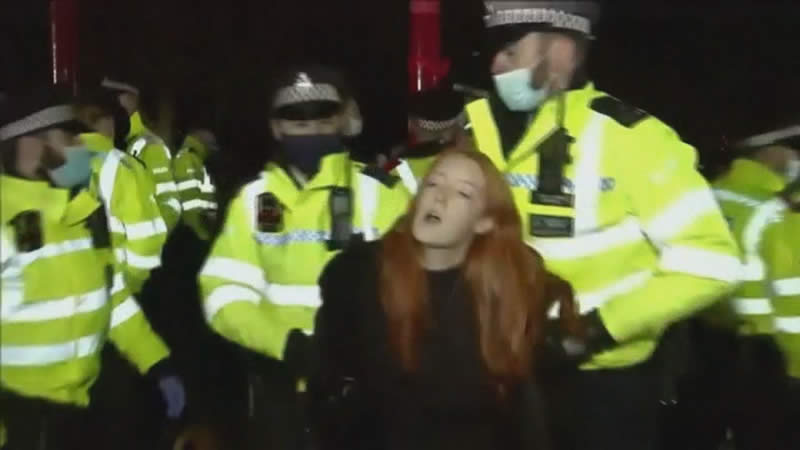
London police chief rejects calls to resign over clashes at Sarah Everard vigil
0
The head of London’s Metropolitan Police has rejected calls for her resignation as public anger in Britain builds over the force’s handling of a murder investigation that involves a fellow officer.
Tensions escalated during the weekend when hundreds of people defied COVID-19 restrictions and gathered in a London park Saturday night in a vigil for the victim, Sarah Everard. Police moved in and arrested four people, prompting shouting and pushing from others in the crowd. Photographs and video showed police officers pinning one woman to the pavement and forcibly removing three women from the park.
The heavy-handed response has sparked a public outcry and led to calls for Commissioner Dame Cressida Dick to step down. Dame Cressida “has lost the confidence of women in London and she must now resign,” Liberal Democrat party Leader Ed Davey said Sunday. “The horrific murder of Sarah Everard has left millions of women angry and in grief. They deserved the opportunity to collectively grieve in a peaceful open air vigil.”
Home Secretary Priti Patel, who oversees the Met, and London Mayor Sadiq Khan have both called for an independent investigation. “I received assurances from the Metropolitan Police last week that the vigil would be policed sensitively. In my view, this was not the case,” Mr. Khan said.
In a statement, British Prime Minister Boris Johnson said: “Like everyone who saw it I was deeply concerned about the footage from Clapham Common on Saturday night.”
Mr. Johnson said he would chair a meeting of senior ministers and police on Monday to look at what more needed to be done to protect women and ensure streets were safe.
In a statement on Sunday, Dame Cressida promised to review the officers’ tactics but she refused to resign. “What has happened makes me more determined, not less, to lead my organization,” she said.
She added that the officers faced an impossible task trying to control the crowd while enforcing COVID-19 restrictions. Most of Britain remains under a strict lockdown and the event infringed on physical distancing regulations. “Unfortunately, later on, we had a really big crowd that gathered, lots of speeches and quite rightly, as far as I can see, my team felt this is now an unlawful gathering which poses a considerable risk to people’s health,” she said.
The circumstances surrounding Ms. Everard’s death have shocked people across the country and damaged the reputation of Dame Cressida, who was hailed as the new face of policing when she took over as the Met’s first female and first openly gay commissioner in 2017.
Ms. Everard went missing during the evening of March 3 while walking down a street in south London after visiting a friend. Her body was found last week about 50 kilometres away in a field in Ashton, Kent. Police have charged Wayne Couzens, a 48-year-old serving Met police officer, with murder but they have yet to find any connection between the two. Mr. Couzens lives in Deal, Kent, roughly 120 kilometres from where Ms. Everard was last seen.
The apparent random nature of the crime has led to an outpouring of grief and concern about women’s safety. An impromptu memorial for Ms. Everard in London’s Clapham Common, close to where she went missing, has been filled with flowers and mourners, including Kate, the Duchess of Cambridge, who made an unannounced visit on Saturday and laid a bouquet.
A group called Reclaim These Streets planned a vigil in the park on Saturday but cancelled the event late Friday after failing to come to an agreement with police over COVID-19 restrictions. Nonetheless, hundreds of people showed up, leading to the police crackdown. “We were shocked and really, really sad, and to see videos of policemen handling women at a vigil about violence against women by men … was painful and pretty triggering,” one of the organizers, Jamie Klingler, told the Press Association on Sunday.
Ms. Klingler and others said Ms. Everard’s killing has raised fears among many women about the safety of London’s streets. Hundreds of demonstrators marched from police headquarters to Parliament Square on Sunday to mourn the death of Ms. Everard and raise awareness of violence against women.
London has a relatively low homicide rate for a city of its size and random killings of women are rare. Last year, the city recorded 126 homicides, down from 150 in 2019, which was the highest total in 10 years. That compared to 774 killings in Chicago last year and 437 in New York.
Figures show that the vast majority of British female homicide victims know their assailant. According to the Office for National Statistics, most women are killed by a current or former partner, a family member or an acquaintance. Just 13 per cent of female homicides in 2019 involved a stranger, the ONS said. By contrast, strangers accounted for one-third of all male killings.
The police have also come under criticism for failing to investigate earlier allegations against Mr. Couzens, who was a member of the Parliamentary and Diplomatic Protection Group.
Just three days before Ms. Everard’s disappearance, Mr. Couzens allegedly exposed himself twice to staff at a McDonald’s restaurant in south London. The Independent Office for Police Conduct has opened an investigation into “whether [police] officers responded appropriately” to the incident. Media reports say the investigating officer failed to verify the licence plate of the suspect’s car and the connection to Mr. Couzens only surfaced during the homicide probe.
In a statement, Scotland Yard confirmed the allegations and added: “It would be inappropriate to comment further given the IOPC investigation.”
